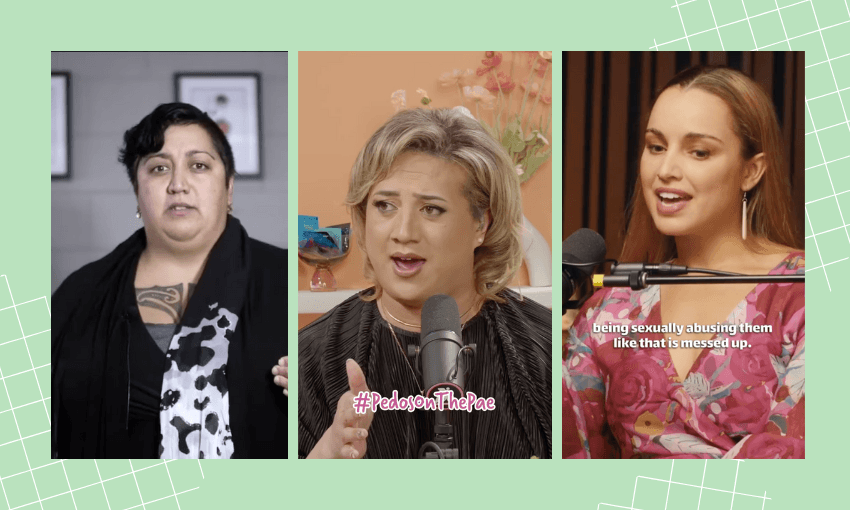As calls grow louder to confront sexual abuse in te ao Māori, a movement led by Māori voices is demanding action. But dealing with abuse in our communities requires more than hashtags.
Over the last month, several Māori content creators have renewed calls on social media for known sexual abusers to be banned from holding positions of power in te ao Māori, with a distinct focus on paedophiles on the pae. The rekindled discussions come after former Te Rūnanga o Ngāpuhi chair Rāniera (Sonny) Tau was sentenced to three years and seven months imprisonment in February for indecent assault against a 16-year-old girl when he was aged 63.
From podcast episodes to calls for wānanga, there is renewed awareness. But this isn’t a new issue. Will it be different this time?
Here are the many truths behind the #PedosOnThePae kaupapa:
Truth #1: The kōrero is growing. Prominent Māori figures like Jess Tyson, Tina Ngata, Quack Pirihi and Te Whetumairangi Balzer-Horo, along with the kaupapa Toitū Ngā Mokopuna, have led discussions online. Videos from “Let’s Talk About Ai” – a series about sexual health hosted by Māori influencers including Pere Wihongi and Turia Schmidt-Peke – have further amplified the issue. No specific allegations have been made in this latest wave, but there’s a broad consensus: this is an issue we must face.
Truth #2: Sexual violence is systemic. Māori are more likely to be victims of sexual abuse than non-Māori. In 2023, the Ministry of Justice estimated over one in five New Zealand adults experience sexual assault in their lifetime. For Māori, it’s almost one in three. Earlier research suggested Māori girls may be twice as likely to experience child sexual abuse as non-Māori.
Truth #3: Māori know this is a problem. According to the latest NZ Crime and Victims Survey, 24% of Māori adults viewed sexual assault as a problem in their neighbourhood, compared to 16% of New Zealanders overall.
Truth #4: This is not new. In 2017, Te Arawa poet and academic Chanz Mikaere called for known paedophiles to be stood down from the paepae. TVNZ’s Marae covered the story, which has since had over 345,000 views on Facebook and many comments acknowledging the need for action.
Truth #5: Talk is cheap. Since 2017, there has been no widespread collective action. A few wānanga. A few viral posts. But no sustained movement. Māori need tools – developed by and for us – to empower collective action.
Truth #6: Victim shaming is common. Tau’s victim said she was ridiculed by her community after sharing her experience. Often, victims are judged more harshly than offenders. Especially if the offender is respected. Speaking out can feel like painting a target on your back.
Truth #7: Our spaces aren’t automatically safe. Marae, kura, kapa haka and wānanga should be safe for tamariki and rangatahi. But safety has to be actively protected. Communities need to be clear: those who cause harm are not welcome.
Truth #8: Responsibility cannot fall on one whānau. Dealing with an offender should never be the sole burden of the victim’s family – or the offender’s. The weight spreads across everyone. Collective support is essential.
Truth #9: Some people knew. Some enabled. And others stayed silent. Sometimes people close to the offender know about the abuse but feel powerless. They may be victims themselves, or fear violence, judgement, or financial fallout.
Truth #10: Even in death, accountability matters. Some offending only becomes widely known after death. That doesn’t mean it should be erased. Tell the truth. Don’t honour people in death for a legacy built on silence.
Truth #11: Not everyone who protects offenders are evil. It can be hard to tell if someone is an enabler, or a manipulated victim too. But silence and protection still cause harm.
Truth #12: Victims must remain central. Offender accountability is important – but victims need the most care, support, and focus.
Truth #13: Some misuse tikanga to excuse harm. There have been alarming claims online that paedophilia was once accepted in Māori tradition. The story of the first human woman Hinetītama – who discovered her husband Tāne was also her father and became Hine-nui-te-pō – is cited as an example of paedophilia that somehow justifies it in modern times. These distortions must be rejected.
Truth #14: This isn’t just about paedophiles. Social media posts have also criticised the ongoing presence of people in power who are known cheaters, abusers or drug users. Not everyone will agree on where the line is drawn. Moral perfection isn’t the goal. But accountability should be.
Truth #15: Tikanga-based approaches need safeguards. Restorative justice can be healing – but it can also be used to protect the wrong people. Kaumātua and cultural leaders need support to navigate these processes ethically.
Truth #16: Social media is powerful – and dangerous. #PedosOnThePae has created solidarity and visibility. But it can also retraumatise, misidentify, or create unsafe pressure. Offline, community-based responses are essential.
Truth #17: This isn’t just a Māori problem – but we need Māori solutions. Colonisation, intergenerational trauma, and the erosion of tikanga have amplified harm. Healing must be whakapapa-based and led from within.
The call to protect our whānau, hapū and iwi from sexual abuse is not new. But it is growing louder. Real change won’t come from hashtags alone. It will come from sustained courage, honest kōrero, and collective action grounded in aroha, accountability and whakapapa.





